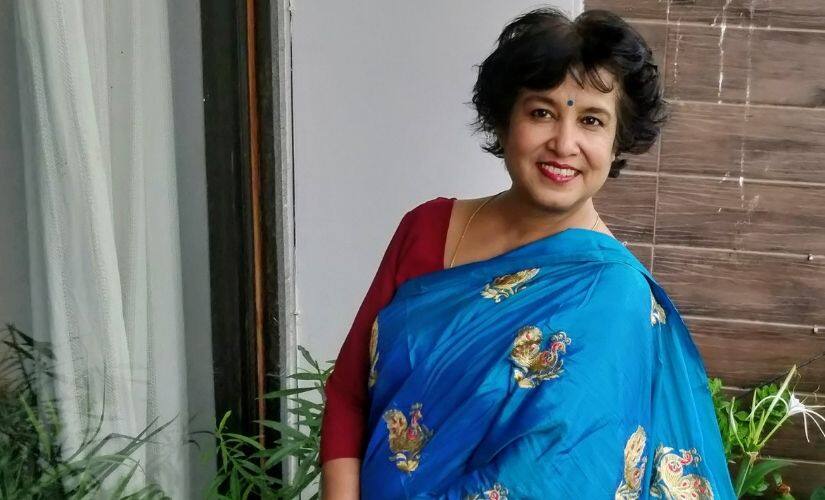Bengali writer Taslima Nasreen, author of Lajja, Exile, and other commentate books, is a well-known advocate of human rights across the world. Her fearlessness, resilience and rationality find testament in her being awarded the Sakharov Prize for freedom of thought, the Simone de Beauvoir Prize for women’s freedom, and the UNESCO-Madanjeet Singh Prize for tolerance, among others. Expectedly, Nasreen speaks her mind — unapologetic and unabashed, making statements that are often considered controversial. Her passport was revoked, while she was forced into exile by Bangladesh 25 years ago, on account of being critical of large, systemic power structures and religions. Ever since, the writer has sought asylum in Sweden (which later went on to grant her citizenship), other countries in Europe, the United States, and India, and is currently left with no hope of returning to her homeland, because of the numerous fatwas issued against her there. “So why couldn’t I live in my country? Because there isn’t freedom of expression there,” she says in a recent interview with Firstpost. [caption id=“attachment_7130181” align=“alignnone” width=“825”]  Taslima Nasrin. Facebook/nasreen.taslima[/caption] In India — where Nasreen has her “adopted” home — she claims to find comparatively more freedom of expression than back in Bangladesh, but still, not enough for an equal society. “We can oppose the government, we can express our views, but there is a limit,” she explains. While she believes in unbridled freedom of expression, she also finds herself doing just the opposite at times. “Sometimes, I think that I should self-censor. If I have to think of that, whose fault is it?” she questions. The feminist writer alerts one to such self-censorship and hesitation, especially among writers and artists, and urges one to move beyond it. “Many writers are harassed because they express views that other people do not like. These kind of things shouldn’t happen in a democracy,” she explains, calling it a ‘fake democracy’. Dissent, considered one of the pillars of a democratic society, upholds an individual’s right to fearlessly express herself — a tenet almost openly challenged by the riots that broke out in Kolkata in 2007, sparked off by a controversy surrounding Nasreen’s writings that were deemed offensive to Muslim sentiments. “If you don’t like or accept your enemy’s freedom of expression, then you don’t believe in freedom of expression," she says. The writer believes artists who can stand up to oppressive forces, have resonating effects through their work, bringing about actual development in society. Of her own work, she asserts that many people have changed after reading them, if not all. It has made them more aware of oppressive structures and inequality. “Lots (of people) become atheists and secular. And even if they don’t become total feminists or humanists, they are on the way, they’re thinking,” she says. Nasreen works closely with NGOs, and has witnessed the impact her writing has had on people. Through her words, she has hoped to change people’s lives for the better, including those for whom access to education remains a challenge. “I can reach them because the people who are working for them are influenced by me. They love my writing and they think that I’m right, and they actually try to spread education and encourage people,” she says. Nasreen lashes out against patriarchal institutions across the world, designed to disadvantage women at every step. According to her, only education can emancipate women and make them independent of abusive husbands and men, by giving them the means to earn their own living. Besides domestic inequality, Nasreen emphasises on stifling social machineries that work to subjugate women. “I don’t think society can be changed if you’re not allowed to criticise the misogynist parts of religion,” she says, citing the example of the recent abolition of triple talaq in India, and how it doesn’t ensure equality for women. According to the writer, religions must go through critical scrutiny, “by questioning the unequal, unscientific, inhuman aspects of religion.” Besides gender, Nasreen also calls out the disparity perpetuated by the caste system, saying that “there should not be any lower caste or upper caste people. All people are equal.” “If a few people have money and they’re billionaires, and others are homeless and penniless, then you cannot say that the country is developed. The gap between the rich and poor must be reduced,” she explains. While people in India do enjoy certain freedoms and rights, the writer refuses to consider it a civilised or developed country, unless it sincerely upholds equality in society. “Equality and justice for everybody will actually make a better and civilised society. So if women are oppressed because they’re women; if people are oppressed because they’re the so called ‘lower caste’, or Dalits, then I don’t think that it is a good society. It is not an equal society. You have to make an equal society, there’s no other way to make the country civilised,” she asserts. At the end of the conversation, the writer-activist expresses her idea of freedom, vis-a-vis the Indian democracy, rather succinctly — “If you do not get equality, you don’t get freedom.” Taslima Nasreen was a panelist on HarperCollins India’s ‘The Debate: Does Freedom Exist?’ , held on 8 August, 2019, 6 pm to 8 pm, at India International Centre, New Delhi.
In an interview with Firstpost, writer Taslima Nasreen talks about living in India because of her exile, and the concept of freedom being impossible in a society without equality.
Advertisement
End of Article


)
)
)
)
)
)
)
)
)



